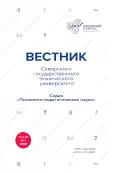Самосохраняющее поведение в студенческой среде как способ борьбы с вредными привычками
- Авторы: Тяглова С.А.1, Рябых А.А.1
-
Учреждения:
- Тюменский индустриальный университет
- Выпуск: Том 20, № 1 (2023)
- Страницы: 115-126
- Раздел: Педагогика высшей школы
- URL: https://journal-vniispk.ru/1991-8569/article/view/144069
- DOI: https://doi.org/10.17673/vsgtu-pps.2023.1.9
- ID: 144069
Цитировать
Полный текст
Аннотация
Рассмотрен генез и причины распространения вредных привычек в студенческой среде (внешние и внутренние). Обзор научной литературы по теме исследования выявил, что вредные привычки как фактор риска различных инфекционных заболеваний и ухудшения работы всех систем организма играют лидирующую роль в снижении качества и продолжительности жизни человека. Ученые едины во мнении, что для решения проблемы распространения вредных привычек среди молодежи необходимы комплексный подход, регулярность профилактических мероприятий и единство цели всех участников образовательного процесса. Цель исследования: разработать модель профилактики на основе изучения структуры и генеза вредных привычек в студенческой среде. Для определения состояния проблемы авторами было проведено исследование среди студентов 3–4-х курсов технического вуза (55 человек в возрасте 18–25 лет), выявляющее наиболее распространенные вредные зависимости во время обучения и их предпосылки, по мнению студентов. Самая распространенная привычка – это курение, далее – неправильное питание, недосыпание и алкоголь. Причем многие привычки были приобретены в подростковом и студенческом возрасте. Большинство студентов относятся нейтрально к их наличию у других людей. На основе полученных результатов представлены возможные варианты решения проблемы в контексте самосохраняющего поведения студентов, актуализирующие возможный потенциал положительного влияния среды вуза на повышение осознанности личности через воспитание ее качеств и положительный пример окружения.
Ключевые слова
Полный текст
Открыть статью на сайте журналаОб авторах
Светлана Александровна Тяглова
Тюменский индустриальный университет
Email: st4182@mail.ru
старший преподаватель
Россия, 625000, Тюмень, ул. Володарского, 38Антон Александрович Рябых
Тюменский индустриальный университет
Автор, ответственный за переписку.
Email: st4182@mail.ru
студент
Россия, 625000, Тюмень, ул. Володарского, 38Список литературы
- Захарова Е.А., Прокопенко Л.А. Оценка и анализ вредных привычек у студентов, обучающихся в вузах // Ученые записки университета им. П.Ф. Лесгафта. – 2021. – № 7 (197). – С. 123–127.
- Ясвин В.А. Технология средового проектирования в образовании // Социально-политические исследования. – 2020. – # 1(6). – С. 74–93.
- Слободчиков В.И. Антропологический смысл профессионального образования (экспертное мнение) // Организационная психолингвистика. – 2020. – № 4 (12). – С. 91–98.
- Тарасов С.В. Управление психологической безопасностью образовательной среды региона на примере Ленинградской области // Журнал правовых и экономических исследований. – 2019. – № 4. – С. 36–41.
- Каменский А.М. Красота как особый образовательный ресурс // Педагогика. – 2021. – Т. 85. – № 5. – С. 55–62.
- Иванова Д.В., Тазов П.Ю. Динамика ценностных ориентаций современной студенческой молодежи в условиях социальных трансформаций // Вестник МИРБИС. – 2022. – № 1 (29). – С. 169–178.
- Овчарова Р.В., Николаева И.А., Малюшина Ю.А. «Идеальное – антиидеальное» в субъективном образе социального мира студентов // Общество: социология, психология, педагогика. – 2021. – № 6 (86). – С. 61–66.
- Тазов П.Ю. Ценности студентов России: векторы социокультурных трансформаций (по материалам исследований 1991–2017 гг.) // Вестник МИРБИС. – 2018. – № 2 (14). – С. 140–146.
- Магдиева Н.Т., Магамедова И.Р., Маммаева А.З. Возможности профилактики рисков здоровью студенческой молодежи в современных условиях модернизации образования // Региональные проблемы преобразования экономики. – 2020. – № 6 (116). – С. 34–39.
- Пшеничников А.Ф., Цеховой В.А. Влияние любительского спорта и вредных привычек на трудоспособность студентов // Ученые записки университета им. П.Ф. Лесгафта. – 2021. – № 11 (201). – С. 369–374.
- Магомедова С.А., Магдиева Н.Т., Мусаева С.Д., Салаватова Н.А. Образование как фактор формирования здоровья и повышения качества жизни современных студентов // Мир науки, культуры, образования. – 2019. – № 1 (74). – С. 67–70.
- Токарев Е.Г. Концептуальные подходы к формированию здоровьесберегающего поведения в среде учащейся молодежи // Казанский социально-гуманитарный вестник. – 2019. – № 5 (40). – С. 33–37.
- Касаткина Н.Э., Мелешкова Н.А., Руднева Е.Л. Педагогическая модель формирования культуры здоровья студентов вуза и готовности к здоровьесбережению // Профессиональное образование в России и за рубежом. – 2019. – № 1 (33). – С. 18–25.
- Литовченко О.Г., Литвинова Н.С., Кошкарова Н.И., Тостановский А.В. Образ жизни студентов как фактор здоровьесбережения // Образовательный вестник «Сознание». – 2021. – Т. 23. – № 11. – С. 20–29.
- Терентьева О.С., Дерябина Г.И., Лернер В.Л. Валеологическое сопровождение учебного процесса в высших учебных заведениях // Вестник Тамбовского университета. Серия: Гуманитарные науки. – 2019. – Т. 24. – № 181. – С. 86–95.
- Ерохина Н.А., Черевишник Н.Н. Актуальные проблемы здоровья и организация здорового образа жизни молодежи // Вестник Саратовского государственного социально-экономического университета. – 2020. – № 2 (81). – С. 153–157.
- Zavyalova M.S., Kalinichenko E.B., Ivanova L.M., Razdobarova M.N. Universal competence of intercultural interaction in learning a foreign language in professional activities. SHS Web of Conferences. International Linguistic Science and Practice Conference “Methods of Teaching Foreign Languages 2.0: Real vs. Virtual”. 2021. Р. 02006.
- Sergeeva M.G., Micheeva N.Ph., Karavanova L.Zh., Stanchuliak T.G., Varlamova I.Yu., Akhmetshina Yu.V., Chauzova V.A. The technology of professional teaching the simulative company as a complex of imitative teaching methods. Xinan Jiaotong Daxue Xuebao. 2020. Vol. 55. No. 1. Рр. 20–33.
- Русскова Ю.Н. Интерактивные технологии профессионального обучения как средство формирования профессиональных компетенций у курсантов и слушателей образовательных организаций // Инновации в образовании. – 2019. – № 8. – С. 89–96.
- Голобокова Я.А. Развивающий потенциал интерактивных методов обучения в процессе формирования профессиональных компетенций обучающихся в военных образовательных организациях // Современное педагогическое образование. – 2020. – № 3. – С. 92–98.
- Казаков Ю.Н. Моделирование условий осознания задач самостимуляции резервов здоровья студента // Мир психологии. – 2018. – № 2 (94). – С. 216–229.
Дополнительные файлы










